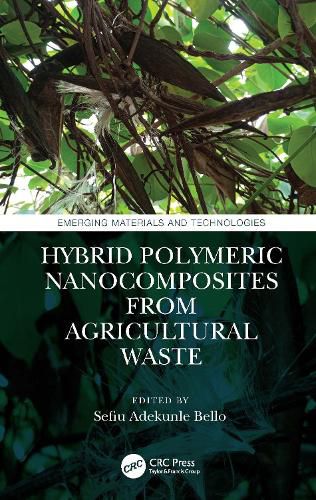Readings Newsletter
Become a Readings Member to make your shopping experience even easier.
Sign in or sign up for free!
You’re not far away from qualifying for FREE standard shipping within Australia
You’ve qualified for FREE standard shipping within Australia
The cart is loading…






Hybrid Polymeric Nanocomposites from Agricultural Waste examines the use of agricultural by-products for green production of new materials. It covers nanoparticle synthesis from agricultural wastes and nanocomposite development with a focus on polyethylene, polylactic acid, polymethylmethacrylate, and epoxy resins, and considers possible biomedical and engineering applications.
Showcases agricultural waste as polymer reinforcements to replace expensive synthetic fibres that discourage wide polymeric nanocomposite applications Discusses green synthesis and characterisation of hybrid nanocomposites from polylactic acid, polymethylmethacrylate, recycled/new polyethylene, and epoxy resins Contrasts hybrid nanocomposites properties with standard nanocomposites, using automotive case studies
The book is aimed at researchers, advanced students, and industrial professionals in materials, polymer, and mechanical engineering and related areas interested in the development and application of sustainable materials.
$9.00 standard shipping within Australia
FREE standard shipping within Australia for orders over $100.00
Express & International shipping calculated at checkout
Hybrid Polymeric Nanocomposites from Agricultural Waste examines the use of agricultural by-products for green production of new materials. It covers nanoparticle synthesis from agricultural wastes and nanocomposite development with a focus on polyethylene, polylactic acid, polymethylmethacrylate, and epoxy resins, and considers possible biomedical and engineering applications.
Showcases agricultural waste as polymer reinforcements to replace expensive synthetic fibres that discourage wide polymeric nanocomposite applications Discusses green synthesis and characterisation of hybrid nanocomposites from polylactic acid, polymethylmethacrylate, recycled/new polyethylene, and epoxy resins Contrasts hybrid nanocomposites properties with standard nanocomposites, using automotive case studies
The book is aimed at researchers, advanced students, and industrial professionals in materials, polymer, and mechanical engineering and related areas interested in the development and application of sustainable materials.